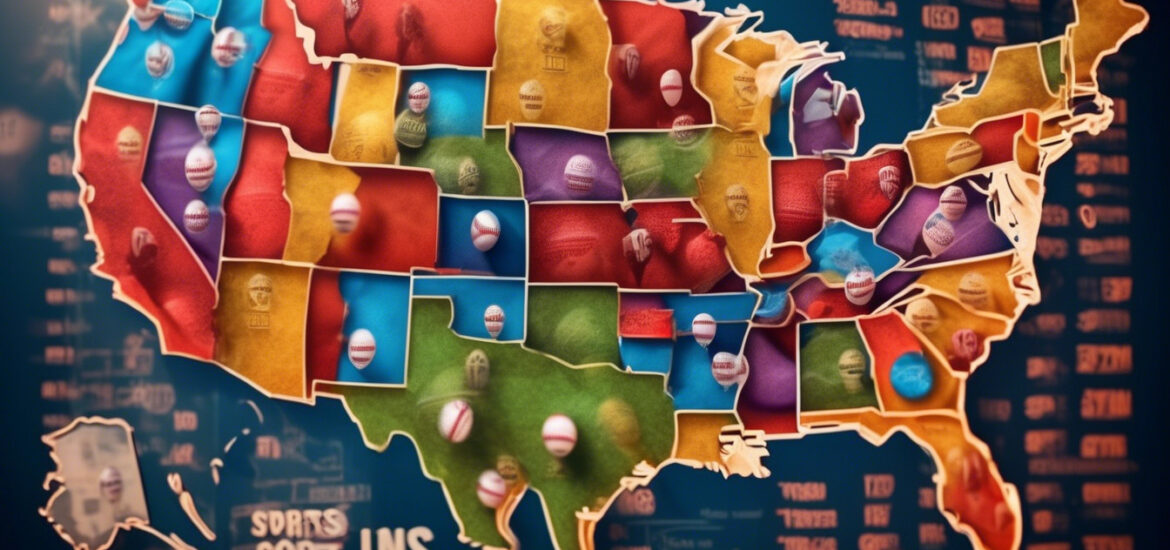As we navigate the ever-evolving landscape of sports betting in the United States, we’re witnessing a fascinating tapestry of regulations and restrictions that vary significantly from state to state. Our curiosity propels us to explore which states have chosen to ban sports betting altogether, a decision that reflects a complex interplay of cultural, economic, and political factors.
In this article, we delve into the reasons behind these bans, examining how states grapple with:
- Potential social implications
- Economic opportunities that come with legalizing sports betting
We also consider the influence of historical precedents and local attitudes towards gambling. By understanding the motivations and challenges faced by these states, we gain a clearer picture of the broader national conversation around sports betting.
Our exploration aims to shed light on the diverse approaches and philosophies that shape the landscape of sports wagering across the country. Through this analysis, readers can better appreciate the complexities and variances in state-level decisions regarding sports betting.
States with Total Sports Betting Bans
Several states in the U.S. have completely banned sports betting, reflecting ongoing debates over its social and economic impacts. These sports betting bans are not solely about gambling but are intricately linked to community decisions on regulating activities that influence local culture and economy.
Many people feel conflicted as they aim to ensure a safe environment while recognizing the potential economic benefits sports betting could bring.
Public opinion plays a significant role in shaping these bans. Communities value their voice in deciding whether to allow betting activities, as they balance moral views with economic interests. In states with bans, there is a commitment to maintaining the chosen regulatory framework, prioritizing local values and concerns.
By sticking together, communities ensure that their collective voice is heard and respected. As discussions continue, it’s crucial to engage in open dialogue, understanding diverse perspectives while striving for a shared sense of belonging and decision-making.
Key Points:
- Community Decisions: Regulation of activities tied to local culture and economy.
- Conflicting Feelings: Balancing a safe environment with economic benefits.
- Public Opinion: Central in shaping bans and balancing moral and economic interests.
- Commitment to Local Values: Maintaining regulatory frameworks in states with bans.
- Open Dialogue: Importance of understanding diverse perspectives for shared decision-making.
Legal Context and Regulatory Framework
In navigating the legal landscape of sports betting, we must consider the intricate web of state laws and federal regulations that shape these activities. Many states have instituted sports betting bans, reflecting a varied regulatory framework and diverse public opinion.
We see a patchwork of laws where:
- Some states embrace sports betting with open arms.
- Others maintain strict prohibitions.
This landscape often reflects the cultural and social values of the communities within each state.
Our shared understanding of these regulations helps us grasp why some states are more restrictive than others. Public opinion plays a significant role in shaping these laws, influencing state legislatures and policymakers.
As members of a community seeking clarity and connection in this complex legal environment, we must stay informed about these evolving regulations. By doing so, we can better navigate the legal intricacies of sports betting bans and understand the regulatory framework that governs our shared interest in this activity.
Impact on Gambling Industry
The bans on sports betting in several states significantly alter the landscape of the gambling industry, compelling us to adapt to shifting market dynamics and consumer behavior. As members of this vibrant community, these sports betting bans challenge us to innovate within the existing regulatory framework. We must ensure our services align with state regulations while meeting the evolving needs of our audience.
Public opinion plays a crucial role in shaping these regulations, and understanding it helps us strategize effectively. We recognize the importance of:
- Engaging with our community
- Fostering a sense of belonging
- Ensuring that our offerings resonate with their values and expectations
The changes in the regulatory landscape push us to explore alternative avenues and diversify our offerings, maintaining our competitive edge.
Together, we navigate these complexities, committed to sustaining a dynamic and inclusive gambling industry that respects the diverse perspectives across different states. Let’s embrace this challenge and evolve collectively.
Social and Economic Ramifications
Many states’ decisions to ban sports betting are reshaping both local economies and the social fabric of communities.
As we navigate these changes, we’re noticing significant shifts in how local businesses and economies adjust within the regulatory framework. Sports betting bans can impact revenue streams, leading to fiscal challenges for some states.
With these bans, tax revenue that could have supported community projects and public services is lost, creating a ripple effect in local economies.
Socially, these bans are bringing about a renewed sense of community focus.
Without sports betting, some individuals and families are finding different ways to engage in entertainment, fostering connections through shared activities.
Public opinion is divided on the issue:
- Some support the bans, valuing the potential reduction in gambling-related issues.
- Others feel that we are missing out on economic opportunities and personal freedoms.
Our collective challenge is to find a balance that respects diverse perspectives while addressing the broader implications of these bans.
Historical Factors Influencing Bans
Throughout history, we’ve seen various cultural, moral, and political influences shape the decisions to ban sports betting in different states. These factors often stem from a shared sense of identity and values within our communities.
Many of us remember when religious and moral beliefs played a significant role in shaping public opinion, leading to strict sports betting bans. This collective mindset fostered a sense of belonging as communities aimed to uphold shared ethical standards.
As we’ve navigated through time, the regulatory framework has also evolved. In earlier decades, the legal landscape was heavily influenced by efforts to maintain order and prevent corruption. Lawmakers sought to protect us by crafting regulations that reflected our shared values. This resulted in sports betting bans designed to:
- Preserve the integrity of sports
- Shield communities from perceived moral decay
By understanding these historical influences, we acknowledge the complex tapestry of beliefs and values that continue to shape our regulatory framework and collective identity today.
Public Opinion and Political Landscape
In recent years, public opinion and the political landscape surrounding sports betting have experienced a significant shift. Communities have become more open to the idea, recognizing potential benefits and desiring collective change. Public opinion now leans toward acceptance, prompting states to reevaluate their sports betting bans and consider implementing more inclusive regulatory frameworks.
Many individuals are eager for a sense of belonging within a broader, more unified sports betting community. This shift in mindset places pressure on politicians to adapt. They need to balance:
- Moral considerations
- Economic opportunities brought by legalized sports betting
Lawmakers are increasingly motivated to establish regulatory frameworks that reflect evolving views and foster a sense of community through shared understanding and engagement.
In this new landscape, we have the opportunity to shape policies that resonate with our values, promoting responsible and fair sports betting opportunities across states.
Challenges of Enforcement and Compliance
Enforcing and ensuring compliance with sports betting regulations presents a myriad of challenges for states transitioning from bans to legalization. As we navigate this shift, we must establish a robust regulatory framework that not only aligns with public opinion but also effectively manages the complexities of the betting landscape. Our communities are eager to embrace change, yet we face the daunting task of balancing freedom with responsibility.
Monitoring and verifying compliance is not just about setting rules; it’s about ensuring they’re followed. Many states emerging from sports betting bans struggle with this aspect. Achieving effective compliance requires:
- Sophisticated technology
- Collaboration across jurisdictions
These measures are essential to ensure that operators adhere to regulations designed to protect consumers and maintain market integrity.
Public opinion plays a significant role in shaping these efforts. Our task is to build trust and demonstrate that a regulated sports betting environment can be safe and beneficial.
Together, we can create a system that respects our communities while fostering a fair and transparent betting culture.
Future Outlook and Potential Reversals
As we look to the future, it’s crucial to consider the possibility of states reassessing their stance on sports betting bans, driven by evolving economic and social factors. With the potential to generate significant revenue and create jobs, states might rethink their regulatory framework.
We’ll likely see some states prioritizing economic benefits over traditional concerns, such as:
- Gambling addiction
- Integrity of sports
Public opinion plays a pivotal role in shaping these decisions. As societal attitudes shift towards greater acceptance of gambling, states might feel encouraged to relax or even reverse their bans. It is important to actively engage in these discussions, ensuring our voices are heard in the evolving landscape of sports betting.
Technological advancements could streamline regulatory frameworks, making it easier to enforce laws and protect consumers. By staying informed and participating in these conversations, we can influence the direction our communities take.
Together, we can create an environment where everyone feels valued and included in decision-making processes.
Conclusion
In conclusion, several states have banned sports betting, which has significant implications for the gambling industry and has sparked debates on its social and economic consequences.
Challenges in Enforcement:
- Enforcing these bans poses several challenges, including monitoring illegal activities and ensuring compliance.
Factors Influencing Bans:
- Historical factors and public opinion play crucial roles in shaping the political landscape regarding sports betting.
Despite the current restrictions, there is potential for reversals in the future as attitudes towards gambling continue to evolve.

